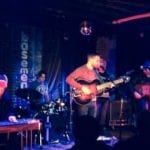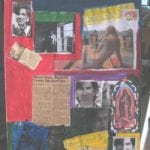Gogol Bordello v. Camper Van Beethoven: Another tedious treatise on authenticity. Maybe.
Most of yesterday morning was spent staring at the arse end of a chicken — actually, seven chickens; the last of two dozen ordered as the barbeque special from Murry McMurray — and contemplating the music of Gogol Bordello.
I did not then know a thing about Gogol Bordello, save that I’d heard the name, probably on NPR, intoned by one of their fine critics who know impossible things about a wide range of music I’ve never had time nor inclination to explore. And I liked the album cover, as it sat atop a stack, a vaguely Soviet graphic package designed by somebody named Josh Cheuse featuring a feral looking bare-chested fellow who might as easily have been a Felice Brother.
Indeed, until I had to pull the CD out of the truck, which is easier than pulling feathers from a newly scalded chicken, and involves considerably less excrement (let it be said now: the nearly headless chicken is still creepy when the beak bangs into your leg), I did not realize that this curious ensemble had ascended to Rick Rubin’s heights. But they have.
In the meantime, I tried to make sense of what I had been listening to, to decide whether this antic frenzy of cultural pastiche was honest or hustle, or both. Whether it was, as the fighting words here were for some years, an authentic expression and extension of cultural relics, or an appropriation.
The Gillian Welch argument.
To which my answer, for the moment (though memory says it’s consistent) says: Is the music any good? In other words, are these Canadian artists more or less authentic purveyors of country music: Hank Snow, Neil Young, or Shania Twain, one from the other?
The album in question from Gogol Bordello is titled Trans-Continental Hustle. It drifts between languages, both sung and played, at a sometimes dizzying speed. In this way I am reminded of Camper Van Beethoven, about whom a long-ago friend and almost sister once said, They sound like summer. And they do, Camper, do, even all these years later.
It never occurred to me to question Camper’s authenticity. They came up through punk rock, glancing again other music traditions and incorporating them with such a sure joie de vivre that I’m emboldened to italicize a phrase in a language I don’t even remotely speak. They were fun, Camper were.
Gogol Bordello are also fun, some of the time. Fun in a too-much-vodka way. Fun in a take your money out of your wallet before entering the club way. Fun in a are you sure the person you’re going home with is the sex you think they are kind of way, although I never was that guy, but I do read the New Yorker.
So that ethnic stew, with more than a hint of danger, infuses Gogol Bordello’s album, this one, their fifth if I’ve counted right, because I came home and turned on the computer and learned a few things. I’d thought, incidentally, this was a band the kids would like, but the kids here — the three I interrogated, hip enough — had no idea what I was talking about. But there’s another edge, a wilder, wilding edge to this which manifests particularly on the fifth track, “Immigraniada (We Comin’ Rougher)” which somehow reminds me of Fatima Mansions’ one great song, “Blues for Ceausescu” fused with a Baltic incarnation of the Dropkick Murphys. (There, did I drop enough names in that sentence to prove I was once a music critic?)
Well. The world wide tower of babel tells me that Gogol Bordello is an ensemble swirling around a fellow named Eugene Hutz, a Ukrainian unhomed by Chernobyl, kicked loose across the Europes until he ended up in New York City. He’s a DJ, a club figure, a compelling lead singer. He calls his music gypsy punk.
It may be. I would be curious to know what Mark Rubin makes of them, as knows as much about gypsy music as anybody of my acquaintance, but I won’t trouble him by asking directly. It may be the real thing, whatever that means these days. I wouldn’t be surprised to discover the whole thing was an elaborate artistic hoax, either.
In the end, I suppose it doesn’t matter, not really. I was entertained driving out to the farm listening to this furious, swirling mess and imagining dark rooms filled with spilled drinks and long skirts in which it might be played. Lofty lofts. Places I would never have been invited. So it goes.
In this way I am entertained, filling the bucket with dripping blood and white feathers.




